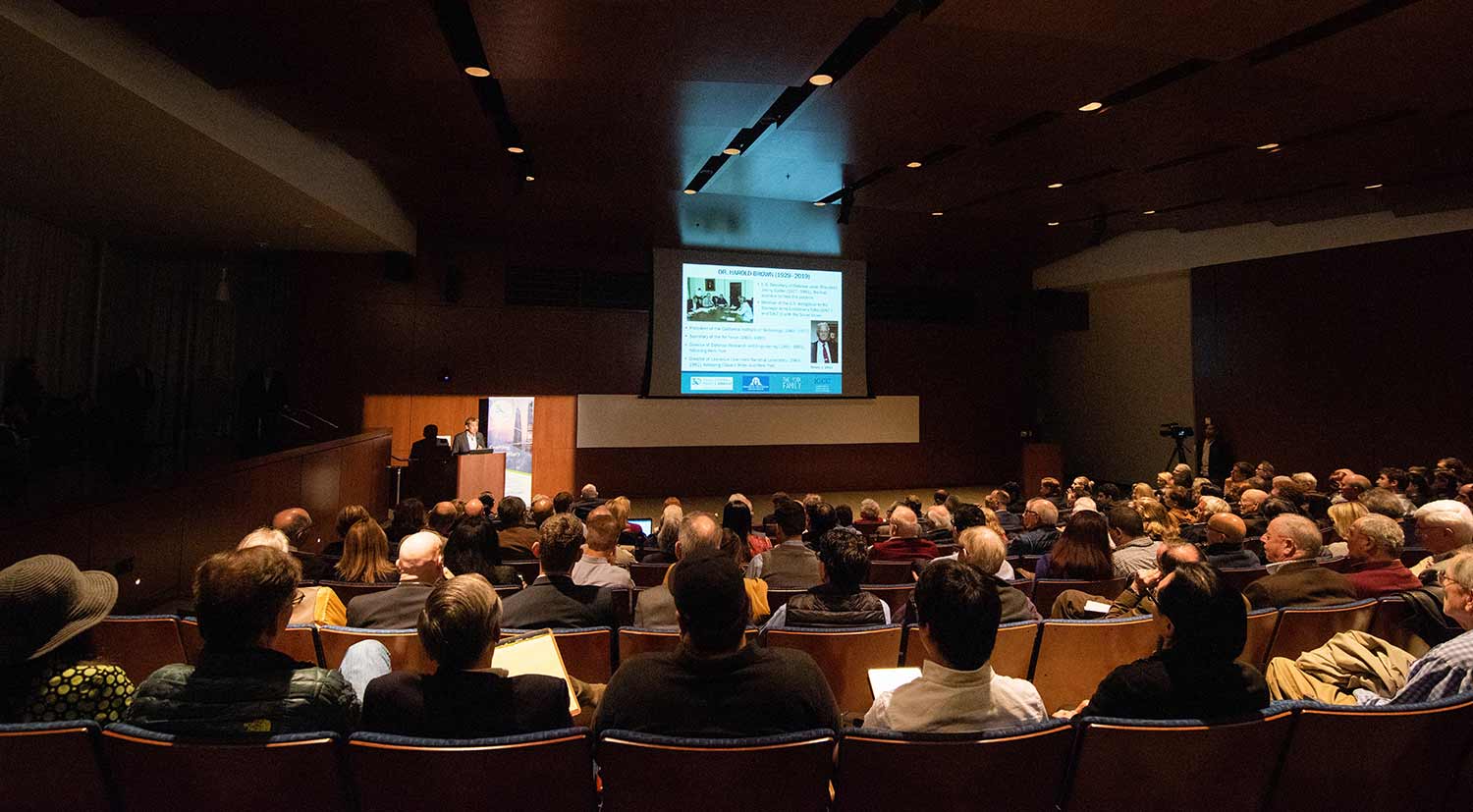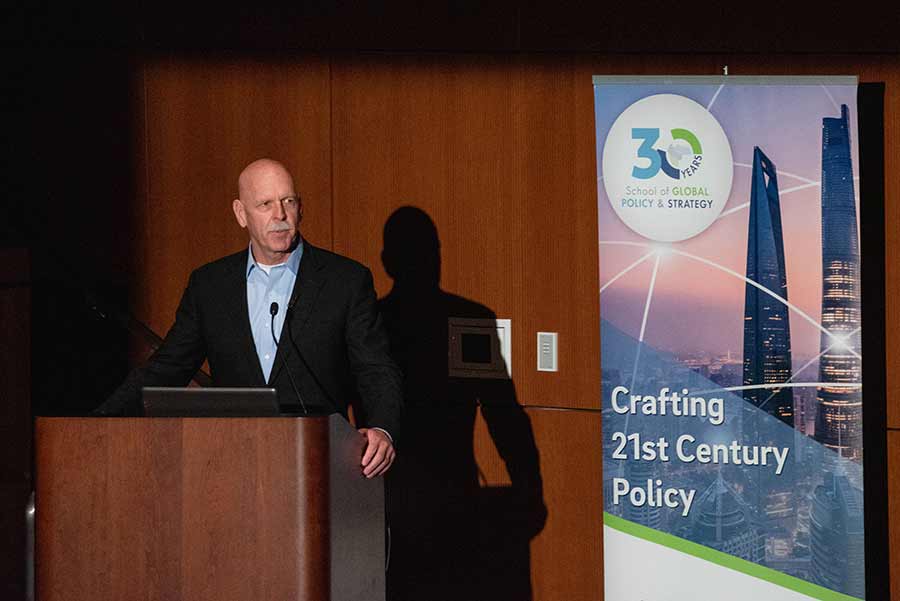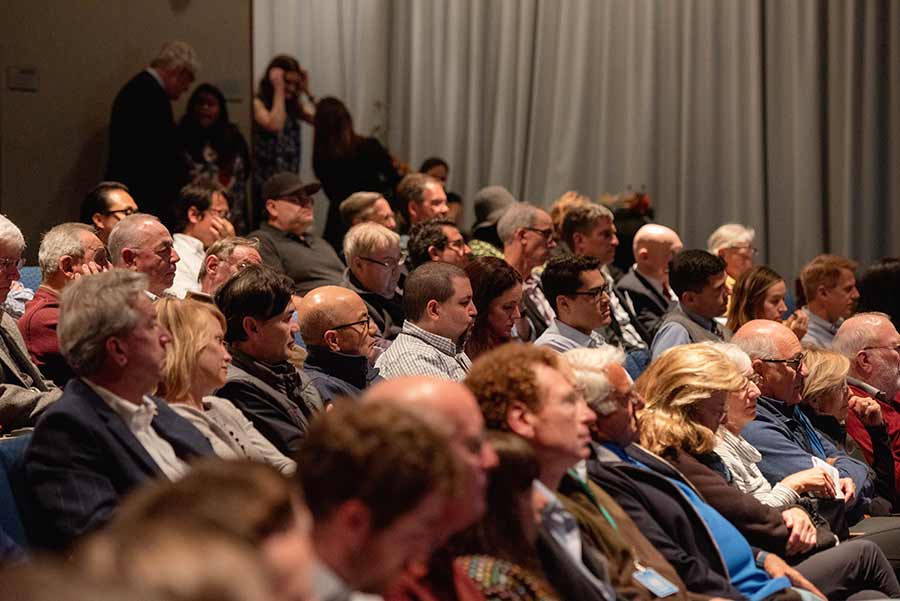
By:
- Christine Clark
- Rachel Hommel
Published Date
By:
- Christine Clark
- Rachel Hommel
Share This:

Members of the campus and surrounding community gathered at the Sanford Consortium for the UC Institute on Global Conflict and Cooperation’s (IGCC) Herb York Memorial Lecture, which is part of the UC San Diego School of Global Policy and Strategy’s (GPS's) 30th Anniversary celebration. Photos by Wesley Ruan/UC San Diego Publications
A New Pacific World Order
Former commander of Pacific Fleet highlights strategic competition between U.S. and China at School of Global Policy and Strategy’s 30th Anniversary event
Is there enough room on the world stage for China and the U.S. to peacefully co-exist? Or is military conflict between the two nations likely, and if so how can it be averted? These questions were at the center of a talk from Admiral Scott Swift, former commander of the Pacific Fleet, to members of the San Diego community on Jan. 16.
At the event, which was the UC Institute on Global Conflict and Cooperation’s (IGCC) Herb York Memorial Lecture and part of the UC San Diego School of Global Policy and Strategy’s (GPS's) 30th Anniversary celebration, Swift spoke about the strategic competition between the U.S. and China against the backdrop of an increasingly stressed international order.
The Balance of Power at a Tipping Point
Swift told the tale of the contemporary rise of international organizations. After the catastrophic ruin of World War II, nations were eager to turn to a rules-based system to help maintain peace and stability and forge cooperation. Entities such as the United Nations, World Bank, World Trade Organization and the International Court of Justice in The Hague, which settles international disputes, were created in the hopes of a more peaceful future.
There may be erosion in the power of the international regime, however. At least where China is concerned. Swift spoke about the territorial dispute between China and the Philippines over a tiny island in the South China Sea called Scarborough Shoal. “What was most compelling to me about the dispute was that China divorced itself completely from the International Court of Justice, and said the court had no merit, nor standing,” he said. “Think of how chilling that is.”

As the 35th commander of the Pacific Fleet between 2016 and 2018, which is the world’s largest, Swift oversaw 200 ships and submarines, nearly 1,200 aircrafts and more than 130,000 sailors and civilians.
Swift was on campus as this year’s speaker for the sixth annual Herb York Memorial Lecture series, which honors the memory of the distinguished nuclear physicist. York was the founding Chancellor of UC San Diego, first director of Lawrence Livermore National Laboratory, first chief scientist of the Advanced Research Projects Agency, and the founding director of IGCC.
IGCC, which is based at GPS, works across the UC system to address pressing and long-term international security concerns and policy challenges.
“Herb York was about understanding what the great security challenges of our time were,” said Tai Ming Cheung, GPS professor and director of IGCC. “While a lot of his focus was on the nuclear arena, he also spent time looking at China and trying to unterstand adversaries better. With this year’s lecture, we wanted to bring in someone who has also dealt with U.S. national security and who knows first-hand how the U.S. relates with key competitors.”
This Risk of Foreign Policy without a Plan
The competition between the United States and China should not necessarily be viewed negatively, according to Swift.
“As China takes its rightful place on the global stage, its rise is in everyone’s benefit and so is competition, as long as we understand the rules that we play by,” Swift commented.
Throughout the evening, he expressed gratitude for institutions such as IGCC and GPS, and the larger UC San Diego campus.
“The issues we face are much more complex,” he said. “We have to understand these problems collectively. This is why supporting institutions like GPS is key. It’s so important to have experts who can foster discussions on these issues and share knowledge with students.”
The value of GPS’s international relations expertise, especially in Asia and the Americas, was also echoed by GPS dean Peter Cowhey. He gave remarks at the event’s opening.
“We have the largest and most accomplished research centers on China and Mexico in the U.S.,” Cowhey said. “The Pacific had become the fulcrum of international relations. In becoming an authority of the Pacific, we have the leading edge of thinking about the globe.”

Swift was selected as speaker for the Herb York Lecture to share his first-hand experience with U.S. national security and how the U.S. relates with key competitors.
In addition to relaying the importance of recognizing the rules-based system that eases tensions diplomatically between nations, Swift spoke about the need for the U.S. to have a grand strategy in its competition with China.
“Does China have a grand strategy?” he asked the audience. “You bet it does. It emerged in 1995 and it took us nearly ten years to recognize it.”
And he encouraged the U.S. to develop our own.
“We need a vision of ourselves, not as Republicans, not as Democrats, but as Americans,” he said, adding that once we have a grand strategy, it will translate into various regional strategies — which China already has in place — and eventually into much-needed policy.
As the 35th commander of the Pacific Fleet between 2016 and 2018, which is the world’s largest, Swift oversaw 200 ships and submarines, nearly 1,200 aircrafts and more than 130,000 sailors and civilians.
“When I was in uniform, I would have meetings with members of Congress and I would often get asked, what resource I needed most,” he explained. “I had a $13 billion annual budget and $500 billion in assets. I would always say, I don’t need resources, I need policy relief.”
Swift conceded that the hardest place to develop a collective strategy is in a democracy, but it can be done. He concluded the talk with a sobering message on the risks of the U.S. being in a competition with China and having no road map.
“The probability of conflict between the U.S. and China is very minimal, but the consequences, if we do have one, are too big to grasp,” he said. “You can’t predict what sets off a war, just like we couldn’t predict what led to either world war. This is why institutions like IGCC and GPS are so critical. We need to have an understanding of what’s at stake.”
Bridging Global Security Networks in Uncertain Times
Prior to Swift’s talk, emerging and established leaders in the fields of national security, defense research and global technology convened for a security innovation forum to ruminate on the rising role of defense and dual use technology that can be used for both civilian and military purposes. The event, organized by IGCC, gave participants an opportunity to contemplate this trend in light of Chinese and U.S. relations, as well as network and make important connections.
“As part of the 30th Anniversary, we want to showcase the research and educational interests that GPS offers in the areas of economics, security and technology,” said Cheung. “We value bringing different communities together that can offer their vantage points in this global, innovation ecosystem.”
Citing this “triple helix” of academia, industry and government, the security and innovation forum attracted about 70 attendees, all leading experts in their field.
“Our campus has a very interdisciplinary nature,” Cheung continued. “A lot of the issues about innovation are not just technological or engineering challenges, the social sciences are an important part of the equation. At IGCC, we connect all these issues to policy and act as the nexus and incubator.”
Building Future Security Experts
One way this this connection is made is in the Master of Advanced Studies in International Affairs (MAS-IA) degree program, specifically the security track. Launched in 2010, the degree prepares students in the study of the study of a range of international economic and political topics. Popular with all four branches of military represented in the program, the school’s unique focus on the Pacific continues to groom the next generation of defense leaders.
As an active duty Lieutenant in the U.S. Navy, William Day, MAS-IA ’19, credits GPS’s strength in the study of the Pacific region as a key selling point. Having been stationed in San Diego from 2012-2016 and having served in two Western Pacific deployments, Day developed a strong appreciation for how crucial the Pacific is to U.S. military operations and foreign policy.
“The U.S. defense industrial complex has a long history of cooperation with research universities; however, for defense research to be useful, it must be policy relevant,” said Day. “Within GPS and IGCC, the research conducted not only allows students to further hone their abilities professionally, but also develop unique policy solutions for addressing global challenges.”
As a Surface Warfare Officer, Day is required to maintain operational proficiency while comprehending the nuances of policy and international relations, and to understand key global players that impact both.
“As China grows in influence, it is crucial for military officers to research and develop a deeper understanding of their history, national goals and military capabilities,” said Day. “In doing so, we can seek continued cooperation in areas of mutual national interest, while allowing our Navy to fly, sail and operate globally in accordance with established international law.”
For alumna such as Ilkania Fernandes, MAS-IA ‘18, GPS allowed her to expand and broaden her perspective on Asian studies while working for the Commander of Naval Surface Forces Pacific as the Staff Information Warfare Officer. Fernandez applauds the flexibility and breadth of the program, expanding her scope of expertise beyond the military realm, honing her analytical skills.
“GPS allowed me to sharpen my critical thinking and analytical skills both of which are crucial in my day-to-day role as an active duty Lieutenant in the Navy,” said Fernandes. “I look forward to using the knowledge gained from my studies at GPS as a Foreign Area Expert throughout the duration of my military service.”
Arming the Service with Social Science Expertise
In addition to training the next generations of international problem solvers and peacemakers through its degree programs, GPS has a well-established history of educating active duty military with pre-deployment briefings. These sessions cover the current geo-political, security, policy, economic and cultural issues in the specific region where the officers will be stationed.
Since 2006, GPS has conducted these briefings for more than 1,000 officers leading battalions into the Asia-Pacific, South Asia/Indian Ocean, the Middle East and North Africa.
According to alumnus John Edwards, MAS-IA ‘15 and a Lieutenant Commander in the U.S. Navy, the school’s cutting-edge curriculum and vast network of visionary leaders are instrumental in fostering cooperation and mitigating conflict on the world’s stage.
“UC San Diego, and GPS in particular, has a very important role to play in helping to develop U.S. grand strategy,” Edwards said. “Because of the work of professors like Tai Ming Chung, students, faculty and alumni are uniquely positioned to lead the discussion and implementation of a new rules-based global order.”
For more information about GPS, go to the GPS website. For more information about IGCC, go to the IGCC website.Share This:
You May Also Like
Stay in the Know
Keep up with all the latest from UC San Diego. Subscribe to the newsletter today.


